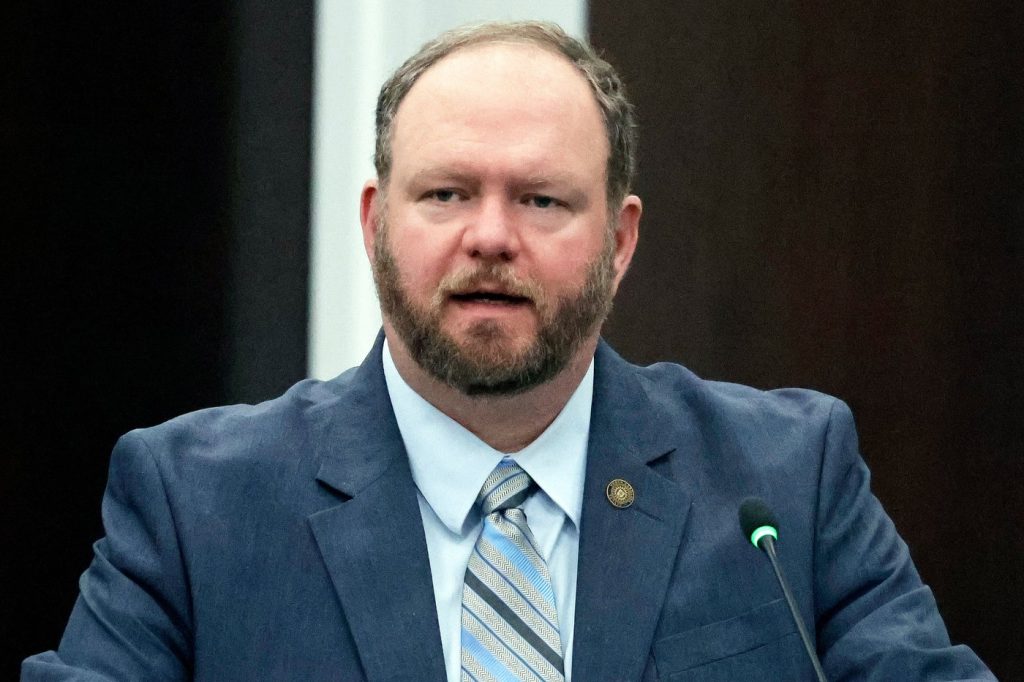RALEIGH, N.C. (AP) – On Wednesday, Republican legislative leaders in North Carolina prepared to finalize a reshaping of part of the state’s U.S. House map, aiming to secure an additional congressional seat for the GOP in anticipation of the midterm elections next year. This reconfiguration seeks to bolster President Donald Trump’s efforts to maintain majority control of the House of Representatives.
The North Carolina House had scheduled floor debates and votes regarding proposed new district boundaries, which, if approved, would target the reelection of Democratic U.S. Representative Don Davis. Davis currently represents over 20 northeastern counties. The state Senate had already passed the plan on Tuesday along party lines.
As Republicans control both chambers of the General Assembly, Democratic Governor Josh Stein is powerless to veto redistricting maps under state law. Therefore, the GOP’s proposal could be executed following favorable votes in the House, unless it faces legal challenges from Democrats or voting rights advocates. Candidate filing for the 2026 elections is set to begin on December 1.
Republicans have indicated that these proposed changes align with Trump’s push for more Republican seats across the nation and aim to solidify the party’s power in Congress while advancing his political agenda. Democrats, on the other hand, are mounting opposing efforts and are in need of only three additional seats to regain control of the House. Historically, the party of the sitting president tends to lose seats during midterm elections.
“The purpose of this map was to pick up a Republican seat. We’ve stated that over and over again,” remarked State Senator Ralph Hise, who had a significant role in drawing up the altered map, during a recent statement.
The national debate over redistricting began earlier in the summer when Trump urged Republican leaders in Texas to revise their U.S. House districts. Following Texas lawmakers' actions, Democrats in California initiated their own redistricting plan, which is pending voter approval in an upcoming election.
According to the newly proposed map, certain counties in Davis’ current 1st District would be exchanged with another coastal district. This redistricting is projected to increase Republican representation in North Carolina to 11 out of the state’s 14 congressional districts, a rise from the current 10 seats held by Republicans, based on statewide election data.
Don Davis serves as one of North Carolina’s three Black representatives, and his district encompasses several majority-Black counties. Opponents of the new map warn that it could lead to accusations of racial gerrymandering, as the district has reliably elected African Americans to the U.S. House since 1992. Davis narrowly won his second term in 2024 by less than 2 percentage points, in a district that has voted for both a Democratic House member and for Trump.
In response to the proposed alterations, Davis characterized the plan as “beyond the pale.” Numerous Democratic and liberal activists rallied at the legislative complex this week, voicing their opposition to the proposal. They condemned the actions of GOP legislators, alleging that they were acting on Trump’s behalf and criticized what they described as a rapid and unjust redistricting process.
“If you pass this, your legacy will be shredding the Constitution, destroying democracy,” warned Karen Ziegler of the grassroots organization Democracy Out Loud during a Senate meeting. She emphasized that the current approach effectively allows Trump to dictate the representation of North Carolina’s citizens.
Democratic representatives argue that the proposed map represents a continuation of racial gerrymandering practices that threaten decades of progress in voting rights, particularly in the region known as North Carolina's "Black Belt." Conversely, Republicans assert that no gerrymandering was involved in the process and emphasize that racial data was not utilized in drawing the districts.
North Carolina’s GOP leaders defended their actions, pointing out that Trump secured the state’s electoral votes in each of his three presidential runs, albeit by narrow margins. They contend that this warrants an increase in Republican support within Congress to further Trump’s legislative agenda. “It is something that is an appropriate thing for us to do under the law and in conjunction with basically listening to the will of the people,” Senate leader Phil Berger stated to reporters.











